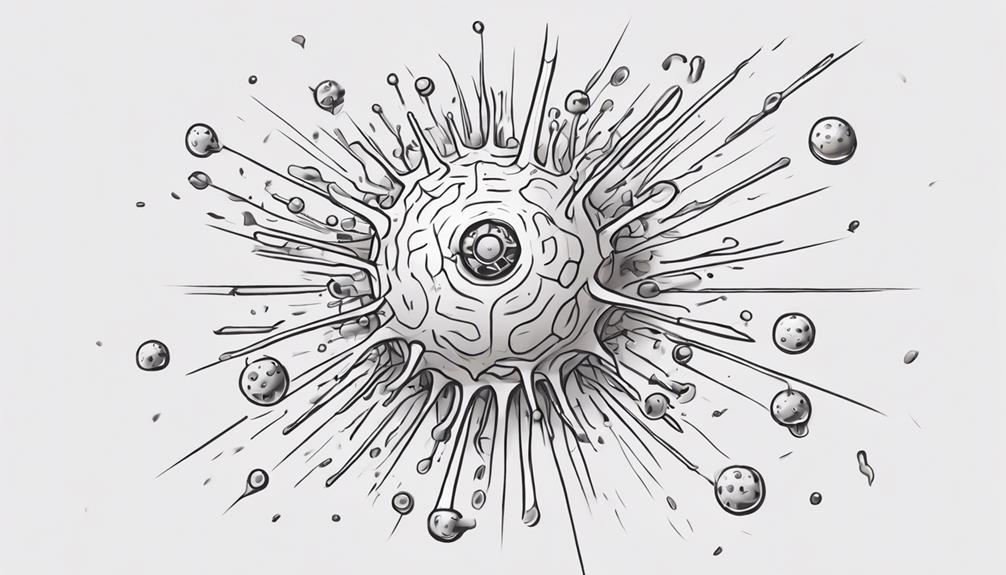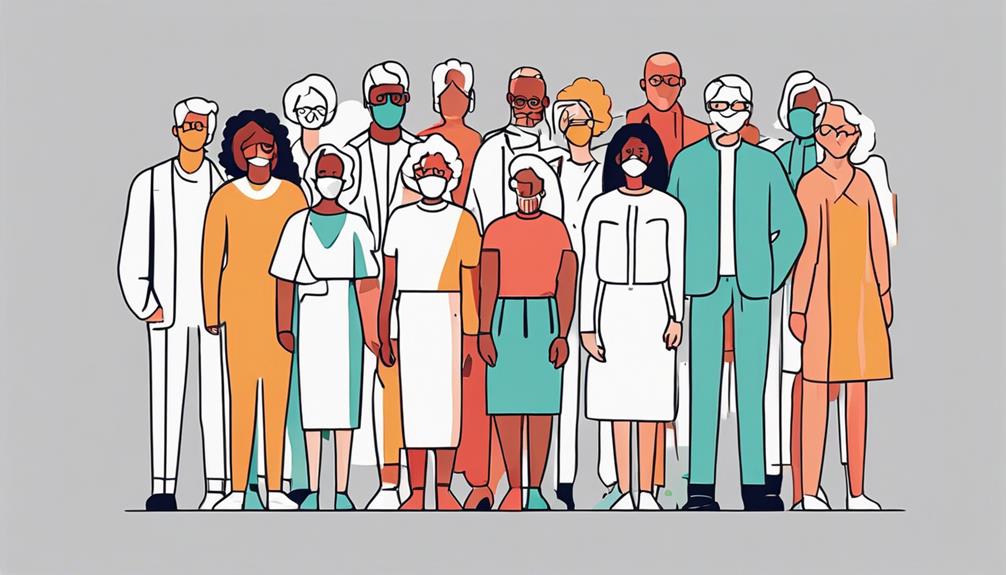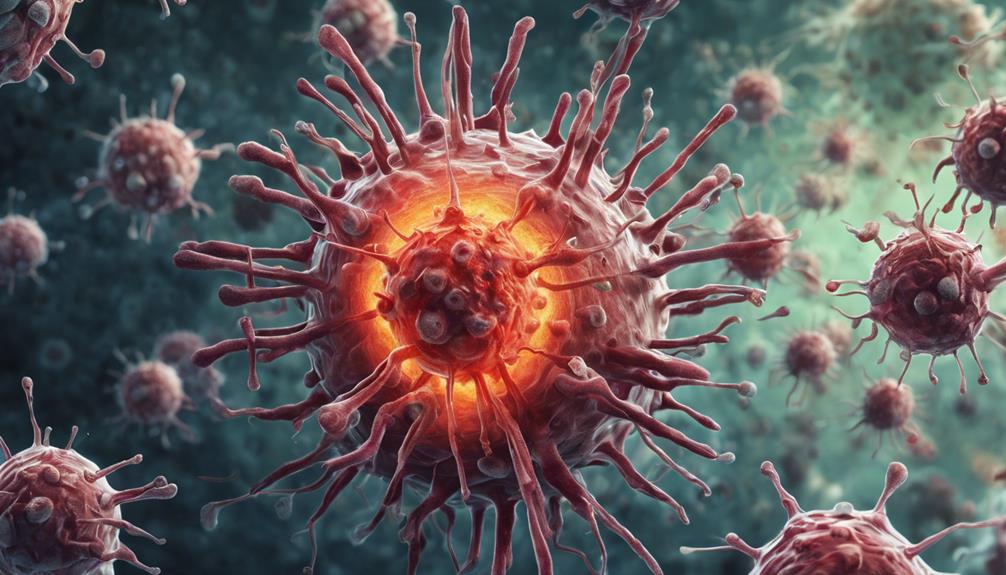Vaccines operate as a sophisticated tool in harnessing the body's immune response to combat infectious diseases. By introducing specific antigens, vaccines prompt the immune system to produce targeted antibodies, establishing a defense mechanism against potential pathogens. This intricate process of immunization not only shields individuals but also contributes to a broader public health strategy. Understanding the intricate workings of vaccines sheds light on their remarkable ability to bolster immunity and curtail the spread of contagious illnesses.
Key Takeaways
- Vaccines stimulate immune system to produce antibodies against specific pathogens.
- Memory cells from vaccines provide long-term protection and faster immune response.
- Herd immunity is achieved through high vaccination coverage, protecting vulnerable populations.
- Vaccines strengthen community immunity, reduce disease spread, and prevent outbreaks.
The Immune System and Vaccines

The immune system, a complex network comprising organs, cells, and tissues, serves as the body's defense mechanism against diseases, with vaccines playing a vital role in educating and enhancing its ability to combat specific pathogens. When a vaccine is administered, it introduces an antigen, a harmless version of a germ, to the immune system. This prompts the immune response, leading to the production of antibodies that recognize and target the specific antigen. These antibodies remain in the system as memory cells, retaining information about the antigen for future encounters. In the event of a real infection, the immune system can quickly recognize and mount a robust defense, effectively eliminating the pathogen before it causes illness. Vaccines essentially train the immune system to respond promptly and effectively to potential threats, thereby preventing diseases and protecting overall health. By bolstering the body's natural defenses, vaccines are instrumental in reducing the incidence of infectious diseases and their associated complications.
How Vaccines Mimic Infections
Having gained an understanding of how vaccines enhance the immune system's response to specific pathogens, a critical aspect to explore is how vaccines simulate infections to elicit protective immune responses. Vaccines contain weakened or inactive parts of pathogens, producing antigens that mimic infections without causing illness. When these components are introduced into the body, the immune system is prompted to respond by producing antibodies specifically targeted against the particular pathogen included in the vaccine. The immune response post-vaccination, which may manifest as mild symptoms, signifies that the body is learning to combat the targeted infection effectively. Additionally, memory cells are generated during vaccination, ensuring long-term protection against future encounters with the pathogen. By imitating infections, vaccines play a crucial role in training the immune system to recognize and combat real pathogens efficiently when encountered. This process is essential in establishing immunity and safeguarding individuals from infectious diseases, highlighting the significance of vaccines, including the innovative mRNA vaccines in modern healthcare strategies.
Importance of Herd Immunity

In the realm of public health and disease prevention, understanding the concept of herd immunity is paramount. Herd immunity, also known as community immunity, plays a vital role in protecting vulnerable populations and limiting disease transmission. Here are key points highlighting the importance of herd immunity:
- Community Protection: Herd immunity occurs when a large percentage of a community is vaccinated, reducing the spread of pathogens and providing a shield for those who cannot be vaccinated.
- Safeguarding Vulnerable Populations: By achieving high vaccination rates, herd immunity acts as a protective barrier for vulnerable groups like infants, elderly individuals, and those with weakened immune systems.
- Preventing Disease Outbreaks: Vaccination not only safeguards individuals but also benefits the entire community by decreasing the likelihood of disease outbreaks and creating a safer environment for everyone.
Maintaining high vaccination coverage is essential to uphold herd immunity and create a shield that safeguards both individuals and the community against infectious diseases.
Vaccines Strengthen Natural Defenses
Vaccines play a crucial role in strengthening the body's natural defenses by boosting the immune response. They enhance antibody production, enabling the immune system to recognize and combat specific pathogens more effectively. Through this process, vaccines train the immune system to mount a robust defense against future encounters with the targeted pathogen.
Boost Immune Response
Strengthening the body's natural defenses, vaccines play a crucial role in boosting the immune response by introducing specific antigens that trigger the production of antibodies. This process prepares the immune system to recognize and combat pathogens effectively, reducing the severity of illness. Vaccines not only enhance individual immunity but also contribute to community immunity by lowering the spread of diseases. By creating memory B- and T-cells, vaccines offer long-lasting protection against future encounters with the same pathogen. The immune response initiated by vaccines is a vital mechanism that takes time to develop, reinforcing the body's ability to combat various diseases.
Enhance Antibody Production
By introducing specific antigens, vaccines play a crucial role in enhancing the production of antibodies within the immune system. These antigens stimulate the immune system to generate specific antibodies tailored to combat the particular pathogen targeted by the vaccine. The antibodies produced in response to vaccination aid the body in recognizing and fighting off harmful pathogens more effectively. This heightened antibody production signifies that the immune system is actively building immunity against specific diseases, equipping the body to mount a swift and targeted defense upon future exposure to the pathogen. Ultimately, vaccines aim to bolster the immune system's capacity to produce antibodies that can effectively neutralize pathogens, thus fortifying the body's defenses and reducing the risk of illness.
Train Immune System
The enhancement of the body's natural defenses through targeted immune system training is a fundamental mechanism by which vaccines confer protection against specific diseases. Vaccines achieve this by introducing weakened or inactive parts of pathogens, stimulating an immune response that leads to the production of antibodies. These antibodies are crucial as they can recognize and fight off the specific diseases more effectively. Additionally, vaccines help in the formation of memory cells that store information on defeated pathogens, bolstering the immune system's ability to mount a rapid and robust defense upon future encounters. Through this process, vaccines play a vital role in educating the immune system on how to combat diseases without causing illness, thus strengthening overall immunity.
Mechanism of Vaccine Protection
Vaccines operate by introducing weakened or inactive forms of pathogens into the body, stimulating the immune system to mount a defense. This process triggers the production of antibodies that can recognize and neutralize specific antigens present in the vaccine. As a result, white blood cells play a crucial role in generating memory cells that provide long-term protection against future encounters with the targeted pathogen.
Vaccine Immune Response
Upon exposure to antigens delivered by vaccines, the immune system orchestrates a coordinated response involving B-cells and T-cells to generate protective antibodies. This process is crucial for building immunity and defending against pathogens. Here is a succinct breakdown of the vaccine immune response:
- B-cells and T-cells collaborate to produce antibodies that target specific antigens.
- The antibodies neutralize pathogens and infected cells, preventing disease.
- Memory B-cells and T-cells are formed to provide long-lasting protection, enabling a rapid response upon re-exposure to the pathogen.
Vaccines play a pivotal role in training the immune system to recognize and combat harmful invaders effectively, ultimately safeguarding overall health.
Antigen Recognition Process
Indisputably, the mechanism underlying vaccine protection hinges on the intricate process of antigen recognition by the immune system. Antigens in vaccines mimic foreign invaders, prompting the immune system to generate specific antibodies. This recognition of antigens is pivotal for creating memory cells, which ensure long-term immune protection. By understanding how the immune system identifies these antigens, we can comprehend how vaccines safeguard against diseases without causing harm. The table below summarizes key points in the antigen recognition process:
| Aspect | Description | Importance |
|---|---|---|
| Antigen | Foreign substance in the vaccine that triggers the immune response | Essential for immune activation |
| Immune System | Body's defense mechanism responsible for recognizing and attacking antigens | Key player in fighting infections |
| Antibodies | Proteins produced in response to antigens, aiding in their elimination | Vital for targeting pathogens |
| Vaccine | Contains antigens to stimulate the immune system, promoting immunity | Instrumental in preventing diseases |
| Memory Cells | Specialized cells that 'remember' antigens for future encounters, providing immunity | Crucial for long-lasting protection |
Memory Cell Formation
With the formation of memory cells post-vaccination, the immune system strategically stores information on conquered pathogens for enhanced future responses.
- Memory B-cells can produce antibodies rapidly upon re-exposure to the same pathogen.
- Memory T-cells can recognize and kill infected cells, providing long-term immunity.
- The formation of memory cells is a key aspect of vaccine-induced protection against specific diseases.
These memory cells essentially act as a library of past infections, allowing the immune system to mount a quicker and more effective defense when encountering the same pathogen again. By retaining this immunological memory, vaccines help prime the immune system for future encounters, bolstering the body's ability to combat pathogens and prevent the development of diseases.
Community-Wide Impact of Vaccination
Community-wide vaccination initiatives play a crucial role in safeguarding public health by creating a shield of protection around vulnerable individuals who are unable to receive vaccines. High vaccination rates within a community reduce the overall spread of diseases by achieving herd immunity, where the majority of the population is immunized, limiting the transmission of pathogens. This not only protects individuals who cannot be vaccinated due to medical reasons but also helps in reducing disease spread, benefiting the entire community. Vaccination campaigns are vital for maintaining community immunity, which is essential for public health and well-being.
| Benefits of Community-Wide Vaccination | |
|---|---|
| Protects vulnerable individuals | Reduces disease spread |
| Achieves herd immunity | Decreases disease outbreaks |
| Safeguards public health |
Frequently Asked Questions
How Do Vaccines Work in the Body?
In response to viral infection, vaccines trigger the immune system to recognize specific antigens, leading to antibody production by B-cells and the elimination of infected cells by T-cells. Vaccination also stimulates the formation of memory cells, which remember the antigen and enable a faster, more robust immune response upon future encounters with the pathogen. This process is crucial for building immunity and providing protection against infectious diseases.
Which Best Describes How a Vaccine Works?
The mechanism by which a vaccine operates involves triggering the immune response, stimulating antibody production to combat pathogens, thereby preventing virus transmission. Subsequently, through the immunization process, the development of herd immunity occurs. This process contributes to the establishment of long-term protection against infections by creating memory B- and T-cells. Vaccination plays a crucial role in promoting public health by bolstering the body's defense system against various diseases.
How Does a Vaccine Work Class 8?
In Class 8, understanding how vaccines work involves comprehending the immune response triggered by introducing antigens, leading to antibody production and memory cell formation. This process serves as a pivotal mechanism for disease prevention by fortifying the body's defenses against specific pathogens. Mastery of these concepts is crucial for grasping the significance of immunization in safeguarding against various infectious diseases.
How Do Vaccines Work for Kids?
Childhood immunizations play a crucial role in protecting kids from serious diseases. Pediatric vaccination schedules ensure timely and effective immunity development, safeguarding children's health. By vaccinating children, herd immunity benefits are extended to the community, reducing the spread of infectious diseases. Addressing parental vaccine hesitancy through education and awareness campaigns is essential for maximizing pediatric vaccine efficacy and preventing outbreaks.
Conclusion
In conclusion, vaccines play a crucial role in protecting individuals and communities from infectious diseases by training the immune system to recognize and combat pathogens efficiently. One interesting statistic to note is that vaccines have helped to reduce cases of measles by 99% globally since 2000, showcasing the significant impact of vaccination programs in controlling and preventing the spread of deadly diseases.
